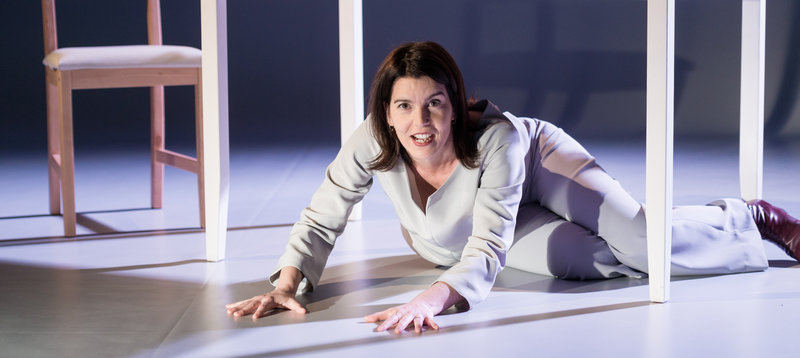Interview
'We should all be feminists'
Laia Marull returns to the theatre with a Catalan version of Jennifer Tremblay's play, The List, in which a woman struggles alone with her feelings of guilt
'Doing a monologue is like doing a master's of interpretation'
Laia Marull has showed in the past that she has real stage presence. She has now taken on a role in which that presence is much needed, as Marull performs entirely alone. Although not exactly alone, as she has the support and direction of fellow actor, Allegra Fulton. She also has the audience close by in Montjuïc's Espai Lluire, where she is performing La llista until February 14.
Clara Segura recently did the monologue, Conillet, at the Espai Lliure. Now it is the turn of another woman with a monologue. What are the similarities?
La llista is, up to a point, a thriller. The protagonist says she feels responsible for someone's death. The work invites the audience to go with the character and discover her thoughts. The text is also filled with lists of things she has to do. She is very picky about doing everything on her lists.
It is rare to be able to say you have done everything.
Indeed,a list is always based on priorities, which float around and never get done until you end up forgetting. This is the crux of our story: a list is an excuse for setting priorities. In the busy world we live in, we often forget the most basic things.
The character in Conillet aspires to live isolated and alone in her lair.
This is different because it means leaving the lair and being brave. She has become paralysed and can only react by being able to explain to the audience. She does not involve them, but speaks to them continuously.
Now you can cross the idea of a monologue off your list. How did it come about?
Years ago I met Fulton, who is the actor who premiered this text. One day she passed it on to me, convinced I'd be interested. Later, she couldn't believe I'd never done a monologue. I accepted the challenge, if she directed. She is also an actor and has done three monologues. Sometimes I think that instead of doing a monologue, I'm doing a master's of interpretation.
The action of the play takes place in a kitchen.
In the script. But our stage is simply an endless white space on which the kitchen and other scenes are projected. It is a voyage through her mind. The protagonist flees the city, but she is very devious. People think that if you go to the country, you fix your life. But no, you just feel very alone. And you cannot escape feelings of guilt. It is the audience who decides if she is really as guilty as she thinks.
Is it a feminist work?
That concept has a bad name. We should all be feminists. So, no, not specifically, a man can also identify with the character.
How is it different from working in front of a camera, without an audience?
They are different and create different energy fields. A monologue requires particular concentration. A film requires strength, when you have to repeat a scene 10 times. In theatre, it has to work every night. It's strange but it is never the same, you always discover things.
What future is in store for La llista?
I hope the Catalan season goes well and maybe we can do a tour in Spanish. We'll see.
Leave a comment
Sign in.
Sign in if you are already a verified reader.
I want to become verified reader.
To leave comments on the website you must be a verified reader.
Note: To leave comments on the website you must be a verified reader and accept the conditions of use.

